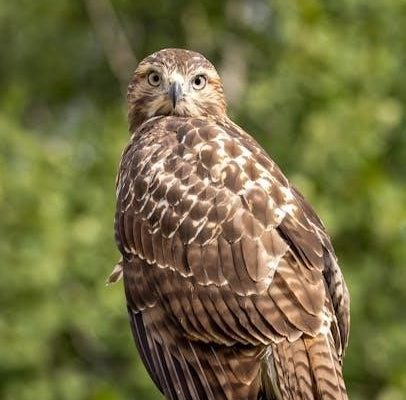Becoming a hunting guide requires a unique blend of outdoor expertise, leadership, and passion for wildlife․ It involves leading hunters safely while ensuring ethical practices and conservation efforts․ This role demands physical stamina, deep knowledge of ecosystems, and strong communication skills to guide clients effectively in various terrains and conditions․ Aspiring guides must also navigate legal requirements, build a client base, and stay updated on industry trends to succeed in this challenging yet rewarding career․
1․1 Understanding the Role of a Hunting Guide
A hunting guide is responsible for leading hunters safely and ethically through various terrains, ensuring successful and memorable experiences․ Their primary duties include tracking wildlife, navigating landscapes, and teaching clients about hunting techniques, safety protocols, and environmental awareness․ Guides must possess extensive knowledge of local ecosystems, weather conditions, and legal regulations․ They also act as educators, sharing insights into wildlife behavior and conservation efforts․ Effective communication and leadership are critical, as guides must manage diverse groups and adapt to unpredictable situations․ The role requires a deep passion for the outdoors, physical stamina, and a commitment to ethical hunting practices, making it both challenging and rewarding for those who pursue this career․
1․2 Importance of Hunting Guides in Wildlife Conservation
Hunting guides play a vital role in wildlife conservation by promoting sustainable hunting practices and educating clients about environmental stewardship․ They help maintain healthy wildlife populations by ensuring hunting activities align with conservation goals, such as controlling invasive species or managing game numbers․ Guides often support anti-poaching efforts and habitat preservation, contributing to the protection of endangered species․ By fostering a deep respect for nature, they inspire clients to become advocates for conservation․ Their expertise in tracking and monitoring wildlife also aids in data collection for wildlife management programs․ Overall, hunting guides are key ambassadors for ethical hunting and biodiversity preservation, ensuring that hunting practices benefit both ecosystems and local communities․
1․3 Overview of the Hunting Industry
The hunting industry is a global market driven by recreational hunting, trophy hunting, and wildlife management․ It supports local economies through tourism, job creation, and the sale of hunting gear․ In the U․S․ alone, hunting generates billions of dollars annually, sustaining rural communities and conservation programs․ The industry includes guided tours, outfitters, and equipment manufacturers, catering to both experienced hunters and newcomers․ Ethical hunting practices are increasingly emphasized, with a focus on sustainability and wildlife preservation․ Technological advancements, such as game cameras and GPS tracking, have modernized hunting, while social media platforms and hunting shows have boosted its popularity․ The industry also plays a role in controlling wildlife populations and maintaining ecological balance, making it a significant contributor to environmental and economic well-being․

Essential Skills for a Hunting Guide
Becoming a skilled hunting guide requires physical stamina, wildlife knowledge, navigational expertise, first aid training, and strong communication abilities․ These skills ensure safe and successful hunting experiences for clients in diverse environments․
2․1 Physical Stamina and Endurance
Becoming a hunting guide demands exceptional physical stamina and endurance․ Guides often trek long distances in challenging terrains, requiring strong cardiovascular health and muscular strength․ The ability to withstand extreme weather conditions, such as cold, heat, or rain, is crucial․ Physical stamina ensures guides can lead clients effectively, handle equipment, and respond to emergencies without fatigue․ Regular exercise and outdoor experience help build the necessary endurance for this demanding role․
2․2 Knowledge of Wildlife and Ecosystems
A hunting guide must possess in-depth knowledge of wildlife behavior, habitats, and ecosystems․ Understanding animal patterns, such as feeding times and migration routes, is essential for successful hunts․ Guides need to identify species accurately and recognize signs of animal activity, like tracks and scat․ This knowledge ensures ethical practices, as guides can avoid vulnerable or protected species․ Familiarity with local flora and fauna also helps in navigating terrain and using natural resources sustainably․ A strong foundation in wildlife ecology enables guides to educate clients about conservation and promote responsible hunting practices, fostering a deeper appreciation for nature and its balance․
2․3 Navigation and Tracking Skills
Navigation and tracking are critical skills for a hunting guide, ensuring safe and effective guidance in the wilderness․ Guides must be proficient in reading maps, using compasses, and interpreting GPS data to locate hunting areas and track game․ Understanding natural landmarks and celestial navigation is also vital․ Tracking skills involve identifying animal signs, such as footprints, droppings, and vegetation disturbance, to predict movement patterns․ These abilities allow guides to lead clients to target species while minimizing environmental impact․ Mastery of navigation ensures safety, while tracking expertise enhances the likelihood of a successful hunt, making these skills indispensable for any aspiring guide․
2․4 First Aid and Emergency Response Training
First aid and emergency response training are essential for hunting guides to ensure client and personal safety in remote areas․ Accidents, injuries, and sudden illnesses can occur, requiring immediate care․ Guides must learn wound management, splinting, and CPR to stabilize conditions until professional help arrives․ Knowledge of wilderness-specific first aid, such as handling altitude sickness or hypothermia, is critical․ Additionally, guides should be trained in emergency communication and evacuation procedures․ This expertise not only saves lives but also builds client trust and confidence․ Many states require guides to hold first aid certifications, making it a fundamental skill for a successful and responsible hunting guide career․
2․5 Communication and Leadership Abilities
Effective communication and strong leadership are vital skills for hunting guides to ensure successful and safe outings․ Clear instruction and active listening help clients understand strategies and stay focused․ Guides must lead with confidence, making quick decisions in dynamic environments to ensure everyone’s safety․ They should also manage group dynamics, addressing diverse personalities and needs while maintaining a positive atmosphere․ Building trust through clear communication fosters a collaborative environment, enhancing the overall hunting experience․ These skills are essential for guiding clients ethically, responsibly, and effectively in the field․
Licensing and Certifications
Obtaining the proper hunting guide license and certifications is crucial for legal operation․ These credentials ensure guides meet safety and expertise standards, building client trust and compliance․
3․1 Obtaining a Hunting Guide License
Obtaining a hunting guide license is essential for operating legally․ Requirements vary by jurisdiction but typically include completing an application, paying fees, and providing proof of identity and hunting experience․ Many states mandate passing a written and practical exam to demonstrate knowledge of wildlife, safety protocols, and local regulations․ Some jurisdictions may also require background checks or first aid certifications․ The license often must be renewed annually or biennially, with continuing education requirements to stay updated on laws and best practices․ Ensure compliance with all state and federal regulations to avoid penalties and maintain professional credibility․
3․2 Required Certifications for Guides
Becoming a hunting guide often requires specific certifications to ensure competence and safety․ Many states mandate guides to complete a hunter education course, while others may require first aid and CPR certification․ Wilderness first responder training is also highly recommended for handling remote medical emergencies․ Additionally, certifications in wildlife conservation or game management can enhance credibility․ Liability insurance is often required to protect both guides and clients․ Some jurisdictions may also demand a background check or proof of hunting experience․ These certifications ensure that guides meet standardized safety and ethical practices, building trust with clients and regulatory bodies․ Staying certified is crucial for maintaining a professional and reputable guiding service․
3․3 Renewal and Maintenance of Licenses
Maintaining a hunting guide license requires periodic renewal, typically annually or every few years, depending on the jurisdiction․ Guides must complete continuing education courses to stay updated on wildlife laws, safety protocols, and conservation practices; Many states require proof of liability insurance upon renewal, ensuring ongoing protection for both guides and clients․ Additionally, some jurisdictions may mandate background checks or hunting experience verification․ Failure to meet renewal requirements can result in license suspension or revocation․ Staying informed about regulatory changes and adhering to renewal deadlines is crucial for guides to maintain their professional status and continue operating legally․ Regular license maintenance ensures guides remain qualified and trustworthy in the eyes of clients and authorities․
Building Experience
Gaining hands-on experience is crucial for aspiring guides․ Start by assisting experienced guides, participating in hunts, and immersing yourself in local ecosystems to build practical knowledge and credibility․
4․1 Apprenticeships with Experienced Guides
Apprenticeships with seasoned hunting guides provide invaluable hands-on experience․ By working alongside experienced professionals, aspiring guides learn essential skills, such as navigation, tracking, and client management․ These mentorship opportunities allow individuals to gain practical insights into the challenges of guiding, from handling diverse personalities to navigating unpredictable terrain․ Apprenticeships also foster a deep understanding of local ecosystems and wildlife behavior, which are critical for successful hunting expeditions․ Additionally, they help build credibility and establish connections within the hunting community, laying a solid foundation for a future career as a hunting guide․
4․2 Participating in Guided Hunts
Participating in guided hunts is an excellent way to gain firsthand experience and insights into the profession․ By joining experienced guides on hunting trips, aspiring guides can observe and learn how to manage clients, navigate terrain, and handle equipment․ These experiences provide practical lessons in tracking, stalking, and ethical hunting practices․ Additionally, they offer opportunities to understand how guides assess weather conditions, read animal behavior, and ensure safety protocols․ Participating in guided hunts also helps build a network of contacts within the hunting community and fosters a deeper understanding of local ecosystems and regulations․ This hands-on approach is invaluable for developing the skills and confidence needed to become a competent hunting guide․
4․3 Gaining Local Knowledge of Hunting Areas
Gaining local knowledge of hunting areas is crucial for becoming an effective guide․ Understanding the terrain, habitats, and behavior of wildlife in specific regions ensures safer and more successful hunts․ Spend time exploring the land, studying maps, and learning about seasonal patterns․ Familiarize yourself with local regulations, permits, and access restrictions․ Building relationships with landowners and other hunters can also provide valuable insights․ Local knowledge enhances your ability to track game, predict movements, and navigate challenging environments․ It also allows you to share detailed information with clients, improving their experience and building trust․ This expertise is key to establishing credibility and ensuring memorable hunting adventures․

Marketing and Business Skills
Mastering marketing and business skills is essential for attracting clients and building a successful guiding career․ Develop a strong online presence, leverage social media, and create engaging content to promote your services․ Focus on client relationships, ensure excellent communication, and deliver memorable experiences to foster loyalty and referrals․ Understanding business principles like budgeting, pricing, and branding will help you establish a profitable and sustainable hunting guide operation․
5․1 Creating a Professional Website
A professional website is a cornerstone of marketing for hunting guides․ It showcases your expertise, services, and unique offerings․ Ensure your site is visually appealing, with high-quality images and videos of your hunting trips․ Include detailed descriptions of your guided tours, pricing, and testimonials from past clients․ Optimize for search engines to attract organic traffic․ Use clear calls to action, such as booking forms or contact information, to convert visitors into clients․ Regularly update your website with fresh content, like blog posts on hunting tips or seasonal updates, to keep visitors engaged and improve your online presence․ A well-designed website builds credibility and helps establish your brand in the competitive hunting industry․
5․2 Utilizing Social Media for Promotion
Social media is a powerful tool for promoting your services as a hunting guide․ Platforms like Instagram, Facebook, and TikTok allow you to share engaging content, such as high-quality photos, videos, and stories from your hunts․ Use hashtags to increase visibility and connect with potential clients․ Regularly post updates, tips, and behind-the-scenes insights to build a community around your brand․ Engage with followers by responding to comments and messages promptly․ Share testimonials and success stories to build credibility․ Collaborate with influencers or other outdoor enthusiasts to expand your reach․ Consistent and authentic content will help establish your reputation as a knowledgeable and reliable hunting guide, attracting more clients to your business․
5․3 Developing a Client Base
Building a loyal client base is crucial for a successful hunting guide career․ Start by offering exceptional service, ensuring memorable and safe experiences for hunters․ Encourage satisfied clients to leave positive reviews and refer others, as word-of-mouth is a powerful marketing tool․ Offer referral incentives to reward clients for bringing in new business․ Engage with potential clients through personalized communication, understanding their needs, and tailoring your services to meet their expectations․ Building trust and rapport with clients will help you establish long-term relationships and a steady stream of bookings․ Consistent follow-up and maintaining a professional reputation will further strengthen your client base and drive repeat business․
Legal and Ethical Considerations

Adhering to local and federal hunting regulations is essential․ Guides must ensure ethical practices, promote sustainable hunting, and obtain necessary liability insurance to protect against accidents or claims․
6․1 Understanding Local and Federal Hunting Regulations
Understanding local and federal hunting regulations is crucial for guides to ensure legal and ethical practices․ Guides must familiarize themselves with permits, bag limits, and hunting seasons․ Federal laws often protects endangered species and regulate cross-state hunting․ Local regulations may vary by region, addressing specific wildlife management needs․ Guides must ensure clients comply with all laws, including proper licensing and equipment standards․ Failure to adhere can result in legal consequences for both guides and clients․ Staying informed about updates and changes in regulations is essential to maintain compliance and uphold conservation efforts․ This knowledge helps guides operate responsibly and sustainably, protecting both wildlife and their professional reputation․
6․2 Ensuring Ethical Hunting Practices
Ensuring ethical hunting practices is vital for maintaining the integrity of the sport and promoting conservation․ Guides must emphasize fair chase, respecting wildlife, and minimizing environmental impact․ Ethical practices include avoiding baiting, ensuring clean kills, and adhering to local regulations․ Guides should educate clients on humane treatment of animals and the importance of leaving a minimal footprint in nature․ Promoting sustainable hunting practices helps preserve ecosystems and maintains healthy wildlife populations․ Ethical guiding fosters trust with clients and supports long-term conservation efforts, ensuring hunting remains a respected and sustainable activity for future generations․

6․3 Liability Insurance for Guides
Liability insurance is a critical aspect of becoming a hunting guide, as it protects against unforeseen accidents or damages․ Guides must ensure they have adequate coverage to shield themselves and their business from potential lawsuits․ This insurance typically covers bodily injury, property damage, and legal fees arising from hunting-related incidents․ Different types of policies, such as general liability and professional liability, may be necessary depending on the scope of operations․ Guides should consult with insurance experts to tailor policies to their specific needs․ Having proper liability insurance not only safeguards personal assets but also builds client trust and ensures compliance with legal requirements․ It is essential for maintaining a secure and reputable guiding business․
Continuous Education
Continuous education is vital for hunting guides to adapt to evolving practices and technologies․ Regular workshops and online courses ensure guides remain informed and professional․
7․1 Staying Updated on Wildlife Management Practices
Staying updated on wildlife management practices is essential for hunting guides․ This involves understanding conservation efforts, habitat management, and sustainable hunting methods․ Guides must stay informed about changes in wildlife populations, hunting regulations, and environmental impacts․ They can achieve this by attending workshops, subscribing to wildlife journals, and engaging with conservation organizations․ Updated knowledge ensures ethical hunting practices and helps guides contribute to the preservation of wildlife and ecosystems․ Continuous learning also enhances their credibility and ability to educate clients effectively, fostering a deeper appreciation for nature and sustainable hunting traditions․
7․2 Attending Workshops and Seminars
Attending workshops and seminars is crucial for hunting guides to enhance their skills and stay informed about industry trends․ These events often cover topics such as wildlife behavior, advanced tracking techniques, and ethical hunting practices․ Guides can learn from experienced professionals and gain insights into new technologies and tools․ Workshops also provide opportunities for networking with other guides, sharing knowledge, and building relationships․ Additionally, many seminars focus on safety protocols, first aid, and emergency response, ensuring guides are well-prepared for challenging situations․ Regular participation in these events helps guides maintain a high level of professionalism and adapt to evolving hunting practices and regulations․
7․3 Learning About New Hunting Technologies
Staying updated on new hunting technologies is essential for guides to remain competitive and effective․ Advances in gear, such as GPS tracking devices, thermal imaging, and precision rifles, can enhance hunting success and safety․ Guides should familiarize themselves with innovative tools like rangefinders, trail cameras, and hunting apps that provide real-time data on wildlife patterns․ Learning about these technologies not only improves efficiency but also ensures compliance with modern hunting practices․ By embracing new tools, guides can offer clients a more rewarding and ethical hunting experience while maintaining their reputation as knowledgeable professionals․ Continuous learning in this area is vital to adapt to the evolving hunting landscape․

Networking and Community Involvement
Building a professional network is crucial for hunting guides․ Joining associations, attending expos, and collaborating with fellow guides fosters knowledge sharing and career advancement opportunities․
8․1 Joining Professional Hunting Associations
Joining professional hunting associations is a vital step for aspiring guides․ These organizations provide access to training, resources, and networking opportunities․ They often host workshops, seminars, and events where guides can learn about new techniques, conservation efforts, and legal updates․ Associations also offer certifications that enhance credibility and open doors to mentorship programs․ By connecting with experienced guides and industry experts, newcomers can gain insights and build relationships that are essential for career growth․ Active participation in these groups demonstrates a commitment to professionalism and ethical hunting practices, which are highly valued by clients and peers alike․
8․2 Participating in Hunting Expos and Events
Participating in hunting expos and events is a great way to network and gain exposure in the industry․ These events bring together guides, hunters, and outdoor enthusiasts, offering opportunities to learn about new gear, techniques, and conservation efforts․ Attendees can attend seminars, workshops, and demonstrations led by experienced professionals․ Expos also provide a platform for guides to showcase their services and connect with potential clients․ By engaging with the community, guides can build their reputation and stay updated on industry trends․ Such events are invaluable for fostering relationships and gaining insights that enhance both personal and professional growth in the field․
8․3 Building Relationships with Other Guides
Building strong relationships with other guides is crucial for success in the hunting industry․ Collaborating with experienced guides fosters mutual learning, as they share knowledge, strategies, and best practices․ Attending expos, workshops, and local meetups provides opportunities to connect and build trust․ These relationships can lead to referrals, joint ventures, and shared resources, enhancing your credibility and network․ Engaging in online forums and social media groups also helps maintain these connections․ By supporting one another, guides create a stronger, more cohesive community, ultimately benefiting both their businesses and clients․ These relationships are key to long-term growth and success in the competitive world of hunting guiding․
Becoming a successful hunting guide requires dedication, expertise, and a passion for wildlife conservation․ By mastering essential skills, building relationships, and staying informed, guides can thrive in this rewarding field while promoting ethical practices and fostering a deep connection with nature․
9․1 Final Thoughts on Becoming a Successful Hunting Guide
Becoming a successful hunting guide is a journey that combines passion, skill, and dedication․ It requires a deep understanding of wildlife, ecosystems, and ethical practices․ Guides must also possess strong communication and leadership abilities to ensure safe and memorable experiences for clients․ Continuous education and adaptation to new technologies and conservation strategies are essential for long-term success․ Building a reputable client base and maintaining professional standards are key to thriving in this competitive field․ Ultimately, a successful guide not only leads hunts but also serves as a steward of the wild, promoting conservation and fostering a connection between people and nature․
9․2 Encouragement for Aspiring Guides
Embarking on the path to becoming a hunting guide is an exciting and rewarding journey․ For those with a genuine passion for the outdoors, wildlife, and sharing knowledge, this career offers immense personal and professional fulfillment․ While challenges exist, the opportunities to connect with nature, mentor others, and contribute to conservation are invaluable․ Aspiring guides should stay committed to continuous learning, embrace ethical practices, and build strong relationships with clients and peers․ With persistence and dedication, you can carve out a successful and meaningful career as a hunting guide, creating lasting memories and fostering a deeper appreciation for the natural world․
